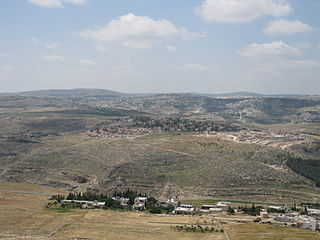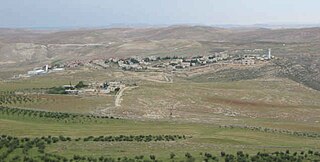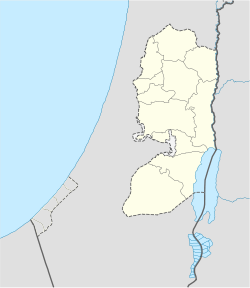Note: This compilation includes only those attacks that resulted in casualties. Attacks which did not kill or wound are not included.
This page is a partial listing of incidents of violence in the Israeli-Palestinian conflict in 2003.
This page is a partial listing of incidents of violence in the Israeli-Palestinian conflict in 2004.
This page is a partial listing of incidents of violence in the Israeli-Palestinian conflict in 2005.

Kedumim, is an Israeli settlement in the northern West Bank. Founded on Hanukkah 1975 by members of the Gush Emunim settlement movement, it later became a local council. In 2022 it had a population of 4,548.

Migdalim is an Israeli settlement in the West Bank. Located 45 kilometres east of Tel Aviv on road 505 and adjacent to the Palestinian village of Qusra, it is organised as a community settlement and falls under the jurisdiction of Shomron Regional Council. In 2022 it had a population of 592.

Tekoa is an Israeli settlement organized as a community settlement in the West Bank, located 20 km northeast of Hebron, 16 km south of Jerusalem and in the immediate vicinity of the Palestinian village of Tuqu'. It falls under the jurisdiction of Gush Etzion Regional Council. In 2022 it had a population of 4,326.

Nokdim is an Israeli settlement organized as a community settlement in the West Bank. Located south of Bethlehem in the northern Judean Mountains, it falls under the jurisdiction of Gush Etzion Regional Council. In 2022 it had a population of 3,094.

Itamar is an Israeli settlement located in the West Bank's Samarian mountains, five kilometers southeast of the Palestinian city of Nablus. The settlement was built on land confiscated from the Palestinian villages of Awarta, Beit Furik,Yanun, Aqraba and Rujeib. The predominantly Orthodox and Religious Zionist Jewish community falls in part within the municipal jurisdiction of the Shomron Regional Council. Under the terms of the Oslo Accords of 1993 between Israel and the Palestine Liberation Organization, Itamar was designated Area "C", under provisional Israeli civil and security control, before a transition period after which Area "C" was to be handed back to the Palestinians. In 2022, it had a population of 1,470.

Beit Hagai, also Hagai, is an Israeli settlement organized as a community settlement located in the southern Hebron Hills in the West Bank. The settlement population was 460 in 2004, according to a classified government document published by the Haaretz newspaper, and lies within the municipal jurisdiction of the Har Hevron Regional Council. The religious Jewish community's name, Haggai, is an acronym of the given names Hanan Krauthammer, Gershon Klein, and Yaakov Zimmerman, three Nir Yeshiva students murdered in the 1980 Hebron terrorist attack. The community rabbi for Beit Hagai is Rabbi Moshe Eliezer Rabinovich (HaLevy). In 2022 it had a population of 725. The international community considers Israeli settlements in the West Bank illegal under international law, but the Israeli government disputes this.

On 24 December 2009, three Palestinian gunmen opened fire on a vehicle near Shavei Shomron in the West Bank, killing an Israeli settler. The Imad Mughniyeh Group, a little-known affiliate of the Al Aqsa Martyrs' Brigades, the armed wing of the Fatah party, claimed responsibility for the attack.

The Bat Ayin axe attack was an attack by a Palestinian man that took place on 2 April 2009 in the West Bank, when Moussa Tayet attacked a group of Israeli children with an axe and a knife, killing 13-year-old boy Shlomo Nativ and seriously wounding 7-year-old boy Yair Gamliel, in the Israeli settlement of Bat Ayin.
Events in the year 2004 in Israel.

The Itamar attack, also called the Itamar massacre, was a terrorist attack on an Israeli family in the Israeli settlement of Itamar in the West Bank that took place on 11 March 2011, in which five members of the same family were murdered in their beds. The victims were the father Ehud (Udi) Fogel, the mother Ruth Fogel, and three of their six children—Yoav, 11, Elad, 4, and Hadas, the youngest, a three-month-old infant. The infant was decapitated. The settlement of Itamar had been the target of several murderous attacks before these killings.
Events in the year 2004 in Palestine.
The 2013 Tapuah Junction stabbing occurred on 30 April, in which an armed Israeli settler, Evyatar Borovsky, was stabbed, disarmed and then, according to some witnesses, shot with his own weapon at a bus stop in the northern West Bank by a Palestinian resident of Tulkarem. The Israeli police described the attacker as a "Palestinian terrorist". The perpetrator was identified as Salam As'ad Zaghal, who had recently been released from 3.5 years in jail for planting explosives. The stabbing was praised by Palestinian President Mahmoud Abbas's Fatah party, its military wing, and its Islamist offshoot the Palestinian Mujahideen movement, and by Zaghal's family. Jewish settlers in the West Bank waged a series of violent reprisal attacks against Palestinian targets in the West Bank, and an Israeli outpost was later named in the victim's honor.

The al-Aqsa Martyrs' Brigades are a Fatah-aligned coalition of Palestinian armed groups in the West Bank and the Gaza Strip.
The 2002 Adora terrorist attack was an attack on residents of the Israeli settlement of Adora. The attack was carried out by two Palestinian militants, who entered the community on April 27, 2002, and proceeded to shoot people in their homes and in the streets. In the attack, four civilians were killed and seven were injured.

Limor Son Har-Melech is an Israeli politician. She has served as a member of the Knesset for the Otzma Yehudit party following the 2022 Israeli legislative election.
The Tulkarm Brigade or Tulkarm Battalion is a Palestinian militant group in the West Bank which is affiliated with various Palestinian political factions. The Tulkarm Brigade appeared first in March 2022 in the Palestinian city of Tulkarm in the West Bank, and is based in the city of Tulkarm and its camps. The battalion was established in late 2021 as a group for the Al-Quds Brigades, although it became independent in March 2022 with its founder Saif Abu Labdeh. Many fighters from Izz ad-Din al-Qassam Brigades joined this group, and in early 2023 many Al-Aqsa Martyrs' Brigades members joined the battalion under the name "Rapid Response Group" founded by Amir Abu Khadijeh.














